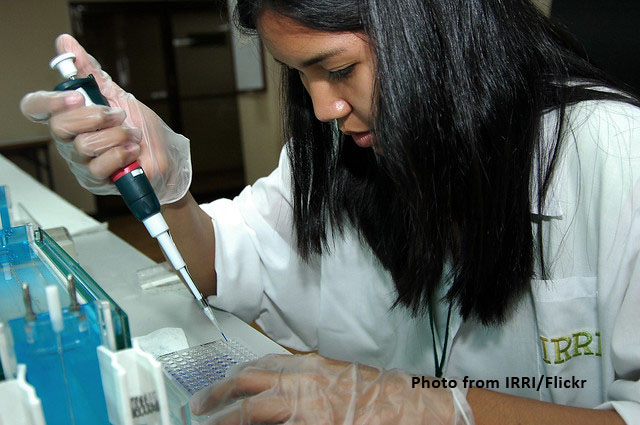
The Philippines needs to invest in science & technology (S&T) if it wants to keep up with other countries that are stepping up in their innovation efforts.
This was according to PIDS Senior Research Fellow Jose Ramon Albert during a seminar on innovation recently organized by state think tank Philippine Institute for Development Studies (PIDS).
According to Albert, investments in human capital are not being prioritized, noting there is very little spending on scholarships for the science, technology, engineering, and mathematics (STEM) strand in the Philippines. This resulted in the lack of local scientists and engineers affecting the country’s innovation performance.
“There’s no systematic effort to address this issue. There is, supposedly, but it’s not enough,” Albert explained. “There are twice more lawyers than there are researchers, scientists, and engineers in this country. That is part of the problem,” he added.
On the other hand, William Padolina, former president of the National Academy of Science and Technology, pointed out that the government do have “money pots” for research & development (R&D) which are lodged in agencies such as the Department of Science and Technology and Department of Trade and Industry (DTI). Some R&D funds are also distributed to offices like the Department of Agriculture and the Commission on Higher Education, as well as state universities and colleges, he said.
However, the concern, according to Padolina, is on how these agencies and institutions manage the R&D funds.
Padolina, who also served as a member of the PIDS Board of Trustees, also lamented the youth’s lack of interest in pursuing higher studies, despite the opportunities and grants being offered by the government.
“Many of our research scholarship slots are not availed of anymore. We don’t know what is happening to the younger generations, but they no longer have the ambition to pursue a doctoral degree,” the former S&T secretary explained.
In the same event, Xavier Cirera, a senior economist at the World Bank, presented the results of the 2019 Philippine Innovation Public Expenditure Review and found that the country has a “large bias in innovation toward S&T”.
He suggested that the government should rebalance its policy mix to include “business innovation”. Furthermore, he said that the focus of policies, especially by the DTI, should not be so much on the size of firms, but on the improvement of their innovation performance.
“Rather than supporting small and medium enterprises per se, support the specific objectives of productivity, of exports…and then think about who needs the support,” Cirera explained.
The World Bank conducts the Public Expenditure Review of Innovation Policy on S&T and innovation to help countries improve their policymaking and budgeting on these areas. ###
This was according to PIDS Senior Research Fellow Jose Ramon Albert during a seminar on innovation recently organized by state think tank Philippine Institute for Development Studies (PIDS).
According to Albert, investments in human capital are not being prioritized, noting there is very little spending on scholarships for the science, technology, engineering, and mathematics (STEM) strand in the Philippines. This resulted in the lack of local scientists and engineers affecting the country’s innovation performance.
“There’s no systematic effort to address this issue. There is, supposedly, but it’s not enough,” Albert explained. “There are twice more lawyers than there are researchers, scientists, and engineers in this country. That is part of the problem,” he added.
On the other hand, William Padolina, former president of the National Academy of Science and Technology, pointed out that the government do have “money pots” for research & development (R&D) which are lodged in agencies such as the Department of Science and Technology and Department of Trade and Industry (DTI). Some R&D funds are also distributed to offices like the Department of Agriculture and the Commission on Higher Education, as well as state universities and colleges, he said.
However, the concern, according to Padolina, is on how these agencies and institutions manage the R&D funds.
Padolina, who also served as a member of the PIDS Board of Trustees, also lamented the youth’s lack of interest in pursuing higher studies, despite the opportunities and grants being offered by the government.
“Many of our research scholarship slots are not availed of anymore. We don’t know what is happening to the younger generations, but they no longer have the ambition to pursue a doctoral degree,” the former S&T secretary explained.
In the same event, Xavier Cirera, a senior economist at the World Bank, presented the results of the 2019 Philippine Innovation Public Expenditure Review and found that the country has a “large bias in innovation toward S&T”.
He suggested that the government should rebalance its policy mix to include “business innovation”. Furthermore, he said that the focus of policies, especially by the DTI, should not be so much on the size of firms, but on the improvement of their innovation performance.
“Rather than supporting small and medium enterprises per se, support the specific objectives of productivity, of exports…and then think about who needs the support,” Cirera explained.
The World Bank conducts the Public Expenditure Review of Innovation Policy on S&T and innovation to help countries improve their policymaking and budgeting on these areas. ###












